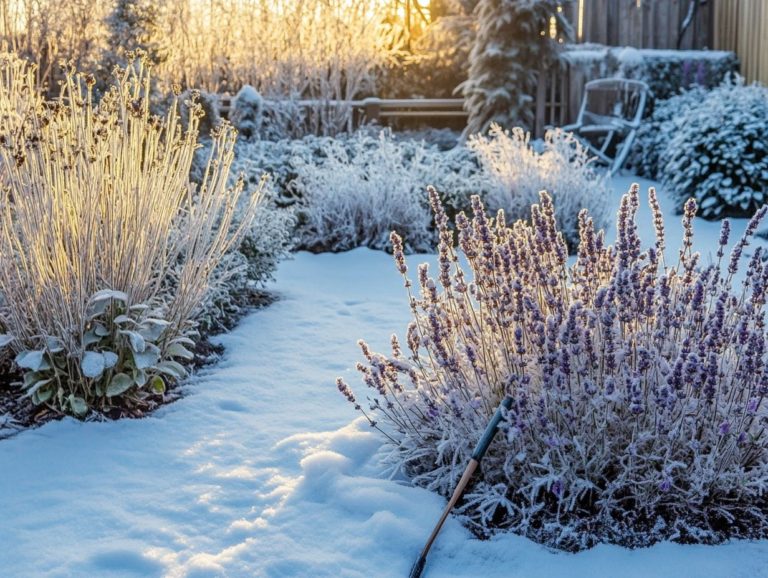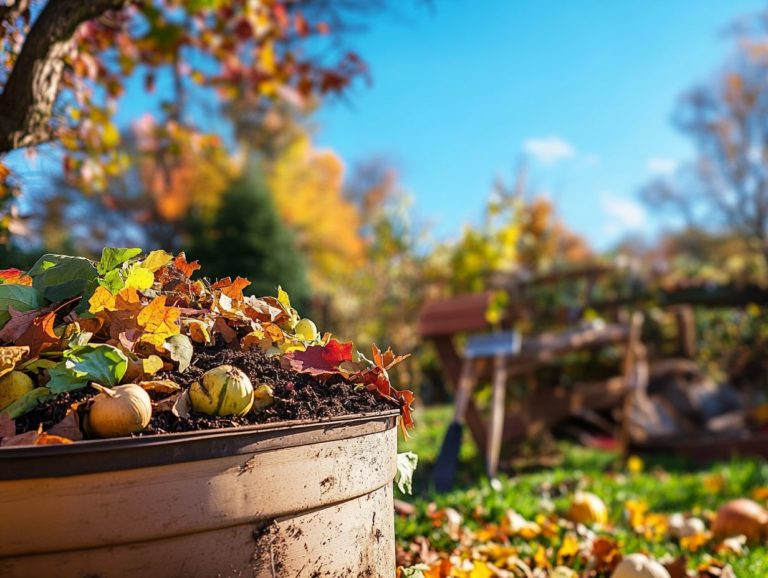5 Ways to Keep Soil Healthy in Winter
As winter envelops your surroundings, it s all too easy to forget about the health of your garden s soil. Yet, nurturing soil vitality during these colder months is essential for ensuring your garden flourishes when spring arrives.
Discover five powerful strategies to keep your soil healthy this winter! This article delves into these strategies, including the benefits of mulching, minimizing heavy foot traffic, and incorporating cover crops. It also highlights the importance of winter soil care and addresses common inquiries regarding soil health.
Keep reading to transform your garden into a thriving ecosystem year-round!
Contents
- Key Takeaways:
- 1. Mulch Your Garden Beds
- 2. Avoid Heavy Foot Traffic on Frozen Soil
- 3. Add Organic Matter to Your Soil
- 4. Use Cover Crops
- 5. Protect Your Soil from Erosion
- Why Is It Important to Keep Soil Healthy in Winter?
- Frequently Asked Questions
- 5 Simple Ways to Keep Your Soil Thriving This Winter!
- How Does Mulching Help Keep Soil Healthy in Winter?
- Why Is Cover Cropping Important for Soil Health in Winter?
- Can I Continue Composting in Winter?
- Is Tilling Recommended for Keeping Soil Healthy in Winter?
- How Does Crop Rotation Benefit Soil Health in Winter?
Key Takeaways:
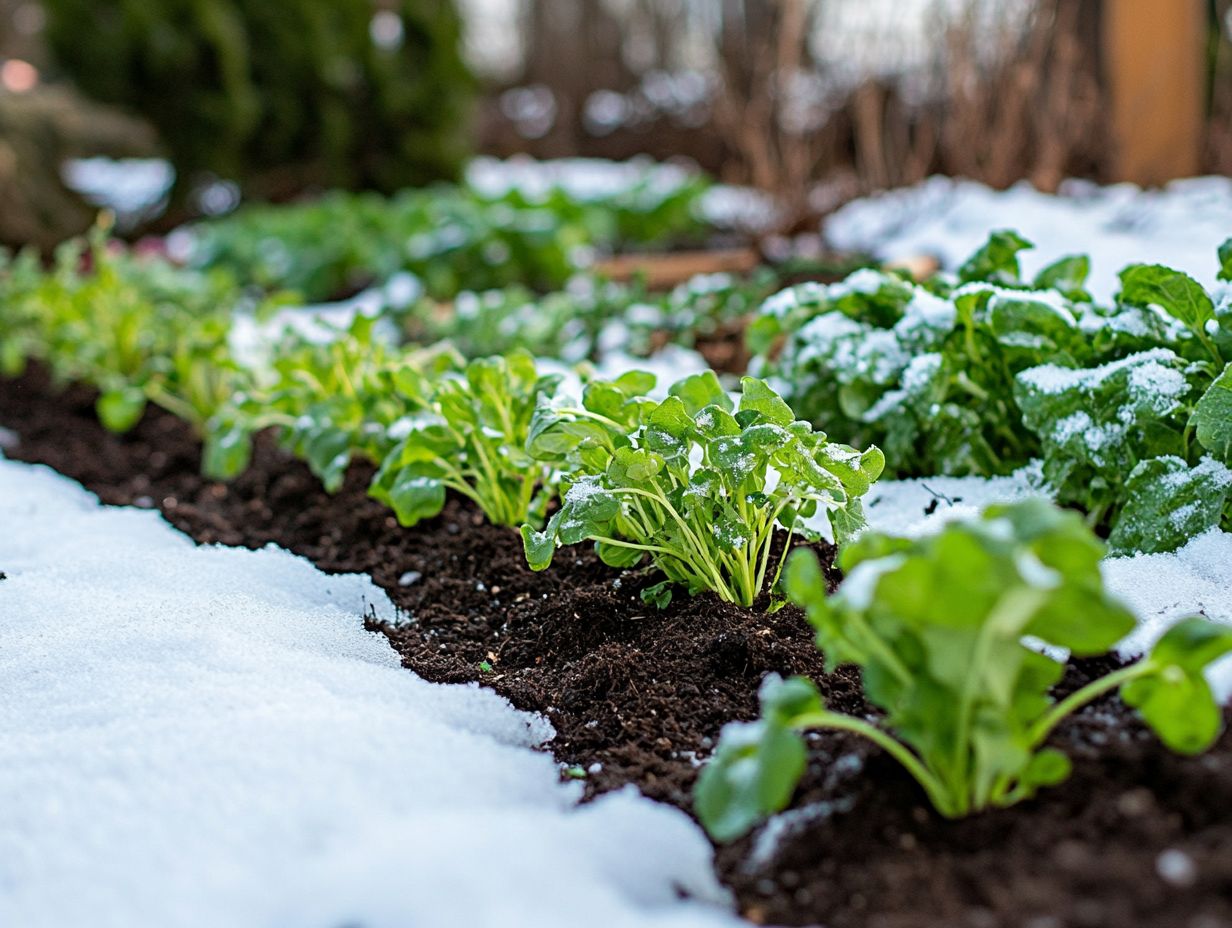
- Mulch is crucial for retaining moisture and protecting soil from extreme temperatures in winter.
- Avoid heavy foot traffic on frozen soil to prevent damaging its structure and causing packing down.
- Adding organic matter, such as compost, to your soil in winter will improve its structure and nutrient content for healthy plant growth.
1. Mulch Your Garden Beds
Mulching your garden beds is an essential practice that elevates soil health, conserves moisture, and fosters beneficial microorganisms. It creates a protective layer over the soil, particularly during the harsh winter months. A thoughtfully mulched bed not only enhances soil structure but also aids in the decomposition of organic matter, enriching the soil that nurtures vibrant plant roots and promotes biodiversity.
You have a variety of mulch options available, such as wood chips, straw, and shredded leaves. Each caters to the specific needs of different plants while suppressing weed growth. These materials work wonders by retaining moisture and reducing evaporation. They also create a hospitable environment for vital organisms like earthworms and microbes, which are crucial for nutrient cycling (the process of nutrients moving through the soil and plants).
To achieve optimal results, apply mulch in a layer that s about 2-4 inches deep. Take care to keep it from coming into direct contact with plant stems. By maintaining this layer, you can significantly enhance soil health, improve nutrient availability, and support robust plant growth throughout the seasons.
2. Avoid Heavy Foot Traffic on Frozen Soil
Avoiding heavy foot traffic on frozen soil is crucial for maintaining its structure and preventing packing down, which can impede essential air and water penetration vital for plant health. During winter, the ground becomes particularly vulnerable to damage, making it imperative to protect your garden soil from excessive weight that could lead to long-term degradation.
When heavy foot traffic occurs, the delicate balance of the soil ecosystem is disrupted, diminishing access to air and moisture for plant roots. Without adequate aeration, roots struggle to absorb nutrients, resulting in unhealthy plants.
Act now by creating alternative pathways, such as boardwalks or designated trails. This will effectively safeguard the soil while still granting access to your garden during the colder months. Implementing strategies like how to build healthy soil in cold climates not only mitigates damage but also enhances air circulation and water retention, ensuring your soil remains healthy and ready to support vibrant plants come spring.
3. Add Organic Matter to Your Soil
Adding organic matter to your soil can significantly enhance its nutrient content and improve the overall health of your garden. This enrichment provides essential elements like nitrogen, phosphorus, and potassium, which promote robust plant growth. By incorporating compost and other organic amendments, you enrich the soil profile and facilitate the decay process, vital for maintaining soil biodiversity.
You can utilize various types of organic matter, such as well-rotted manure, leaf mold, and green manures. Each offers unique advantages. Compost improves soil structure while retaining moisture, whereas leaf mold enhances aeration and nutrient supply as it decomposes.
When integrating these materials into your existing soil, it’s crucial to mix them thoroughly for even distribution. Topping it off with mulch creates a protective layer that helps retain moisture and suppress weeds. Regular soil testing allows you to tailor your amendments to meet specific soil pH and nutrient needs, fostering a thriving ecosystem in your garden.
4. Use Cover Crops
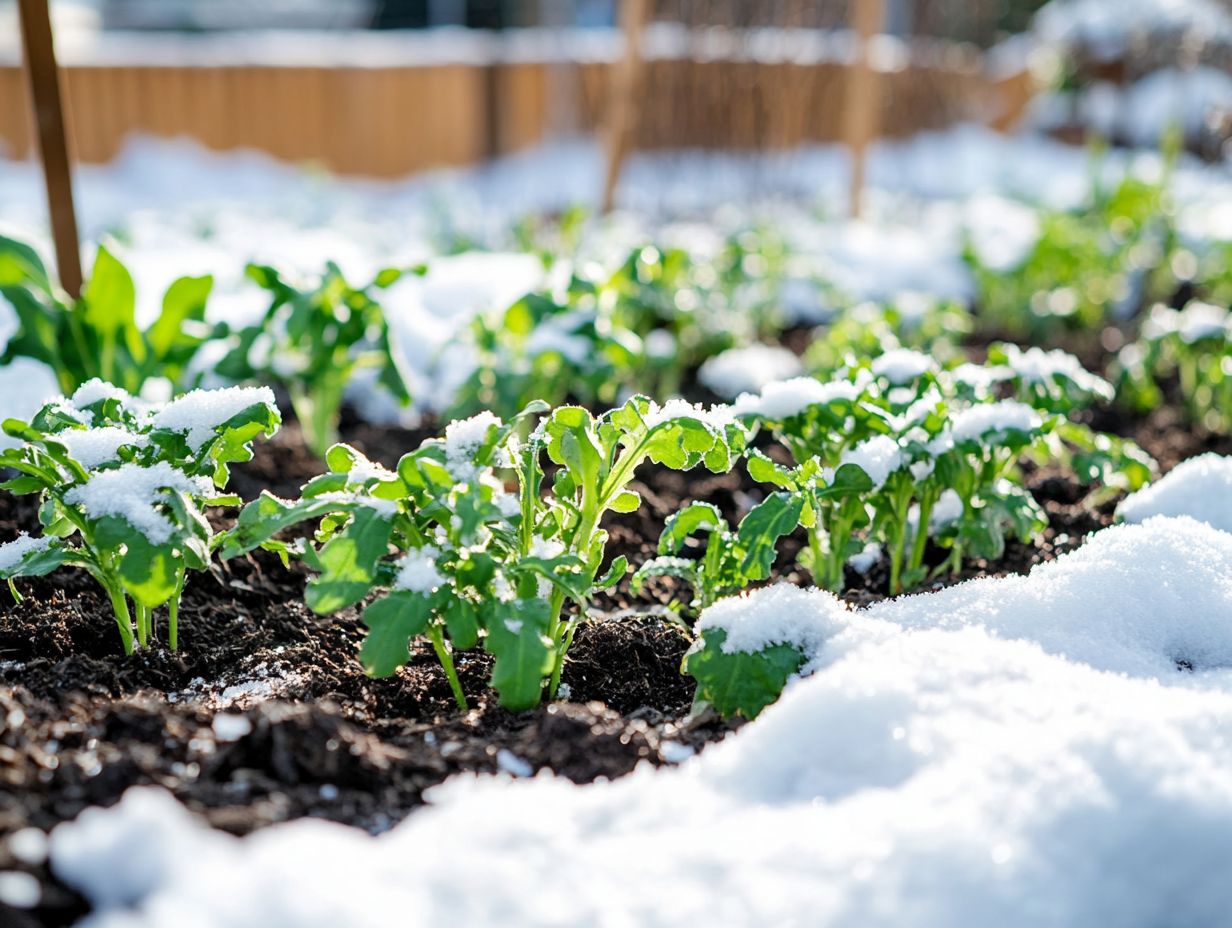
Cover crops enhance soil health. They protect against erosion and improve soil structure during winter.
Cover crops like rye, vetch, and clover offer great benefits. Rye suppresses weeds and anchors the soil to reduce erosion.
Vetch enriches the soil with nitrogen, making it fertile for future planting. Clover serves as living mulch, supporting beneficial microorganisms.
Selecting winter cover crops boosts soil health. This leads to a productive and resilient garden environment.
5. Protect Your Soil from Erosion
Protecting soil from erosion is vital for your garden. It keeps essential nutrients in place and safeguards beneficial insects.
Using mulch and planting cover crops can greatly reduce erosion. This contributes to healthier soil and better moisture retention.
Plant barriers like hedgerows and windbreaks reduce wind and water runoff. They act as natural shields for your garden.
Establish proper drainage systems to manage excess water. This prevents muddy conditions and nutrient loss.
Maintaining soil biodiversity is crucial. A diverse microbial community boosts nutrient cycling and resilience against erosion.
Why Is It Important to Keep Soil Healthy in Winter?
Healthy soil in winter supports plant life and ensures nutrients are available when spring arrives. For tips on maintaining this crucial resource, check out how to prepare your soil for winter crops, as it acts as a reservoir for essential nutrients.
During winter, implement strategies to support soil integrity. For example, adding organic matter like compost or mulch can improve moisture retention and prevent erosion. Consider these 5 ways to keep your cold garden thriving for optimal results.
Cover crops enhance nutrient cycling and provide habitat for active microorganisms. These practices protect against nutrient loss and foster a resilient ecosystem.
Regular soil testing before winter provides insights into nutrient levels and pH balance. This helps maintain optimal soil health.
What Are the Consequences of Neglecting Winter Soil Care?
Neglecting winter soil care can have significant repercussions. These include soil erosion, compaction, and the depletion of essential nutrients crucial for vibrant plant growth in the upcoming season.
The harsh winter conditions can wipe out beneficial microorganisms. This disrupts the fragile balance of soil health and makes it increasingly difficult for you to maintain a flourishing garden.
When soil erosion occurs, the nutrient-rich top layer washes away. This leads to a drop in productivity and a diminished capacity to support new plant life.
This not only reduces your crop yields but also increases water runoff, worsening local flooding and sediment buildup in nearby water bodies.
To counteract these challenges, implement cover crops during the winter months to help retain soil structure. Additionally, consider using tips for sustainable winter gardening, as mulching is another effective method to protect against erosion.
Practicing crop rotation and adopting no-till farming techniques can greatly improve soil fertility. Together, these strategies create a resilient ecosystem that s primed for the spring planting season.
What Are the Best Types of Mulch for Winter?
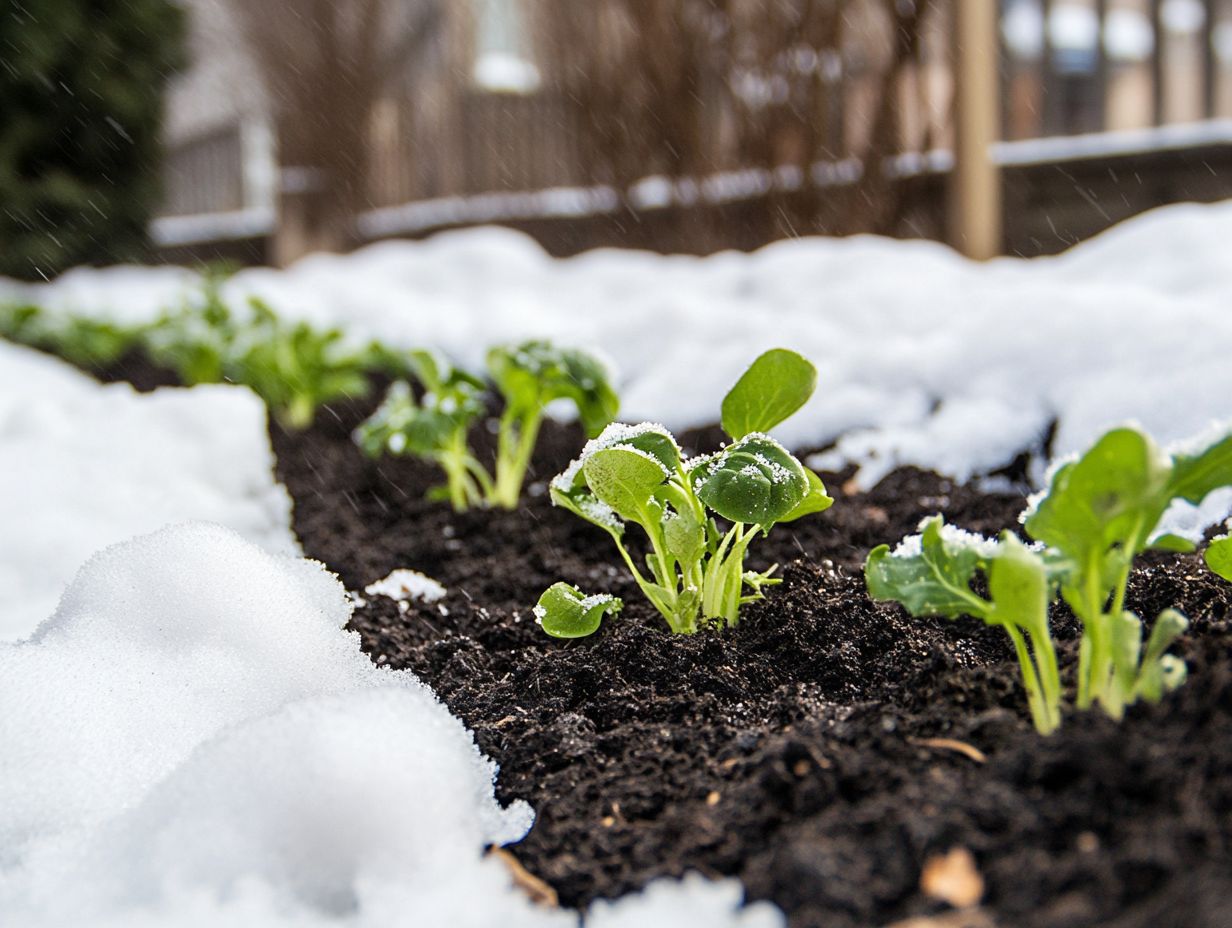
Choosing the right types of mulch for winter can significantly enhance your garden’s health. It can boost moisture retention and shield your plants from the rigors of winter.
Consider using organic materials like straw, wood chips, or shredded leaves. These not only insulate plant roots but also break down gradually, enriching the soil with essential nutrients.
You might also consider materials like pine needles and compost. Pine needles create a protective barrier that retains moisture while preventing soil erosion.
Their natural water-repelling properties are particularly beneficial. Compost, with its rich nutrient content, helps maintain a stable soil temperature, nourishing your plants even in the cold months.
For optimal benefits, apply a mulch layer that s at least three to four inches thick around the base of your plants. Ensure it s kept clear of their stems to prevent rot.
Regularly monitor and refresh the mulch layer as it decomposes. This will help sustain its effectiveness throughout the winter season.
How Can You Protect Your Soil from Heavy Rain and Snow?
Protecting your soil from heavy rain and snow is crucial for preventing erosion. It also helps maintain the integrity of your garden ecosystem, especially during unpredictable winter months.
Don t wait! Implement these strategies now to safeguard your garden. Effective soil management strategies include incorporating organic matter, using mulch, and planting cover crops.
One impactful method is introducing cover crops like clover or rye. These crops serve as a protective barrier, improving soil structure while enriching its nutrient content.
Adding a layer of organic mulch retains moisture during dry spells and minimizes surface runoff, further safeguarding the soil beneath.
By consistently employing these proactive soil management practices, you can cultivate healthier crops and foster a more resilient garden environment. This ensures that your soil remains productive even in challenging weather conditions.
What Are the Benefits of Using Cover Crops in Winter?
Using cover crops in winter presents numerous benefits. They enhance soil nutrients, improve soil health, and prevent erosion all essential for nurturing a more fertile garden come the growing season.
These winter cover crops are pivotal in crop rotation practices. They enrich the soil with organic matter while fostering a vibrant ecosystem within your garden.
By incorporating species like clover, rye, or vetch, you can significantly elevate nitrogen levels and achieve a superior soil texture.
Clover serves as a natural fertilizer, while rye excels at suppressing weeds and preventing soil compaction.
These practices promote sustainable gardening and create a protective layer over the soil, minimizing nutrient runoff.
The diversity of plant roots further aids in breaking up hardpan, which is a dense layer of soil that water can’t easily penetrate, enhancing water infiltration and establishing a thriving habitat for beneficial organisms.
Ultimately, these winter cover crops lay the foundation for productive, resilient gardens that flourish season after season.
How Can You Test the Health of Your Soil in Winter?
Testing the health of your soil during winter is essential for ensuring optimal soil nutrients, pH, and overall structure. These factors directly influence your garden’s productivity in the growing season.
Doing a soil test allows you to assess the levels of organic matter and crucial nutrients. This helps you make informed decisions about the amendments and enhancements necessary for a flourishing garden.
This process is simple but effective. It checks nutrient levels and pH, which is crucial for plant health. To conduct a proper soil test, collect samples from various locations within your garden to create a representative mix.
Once you send these samples to a lab, focus on the analysis. Pay close attention to key nutrients like nitrogen, phosphorus, and potassium, as well as any deficiencies.
Understanding these factors helps you enrich the soil effectively while avoiding potential nutrient imbalances. This knowledge will empower your gardening like never before!
Frequently Asked Questions
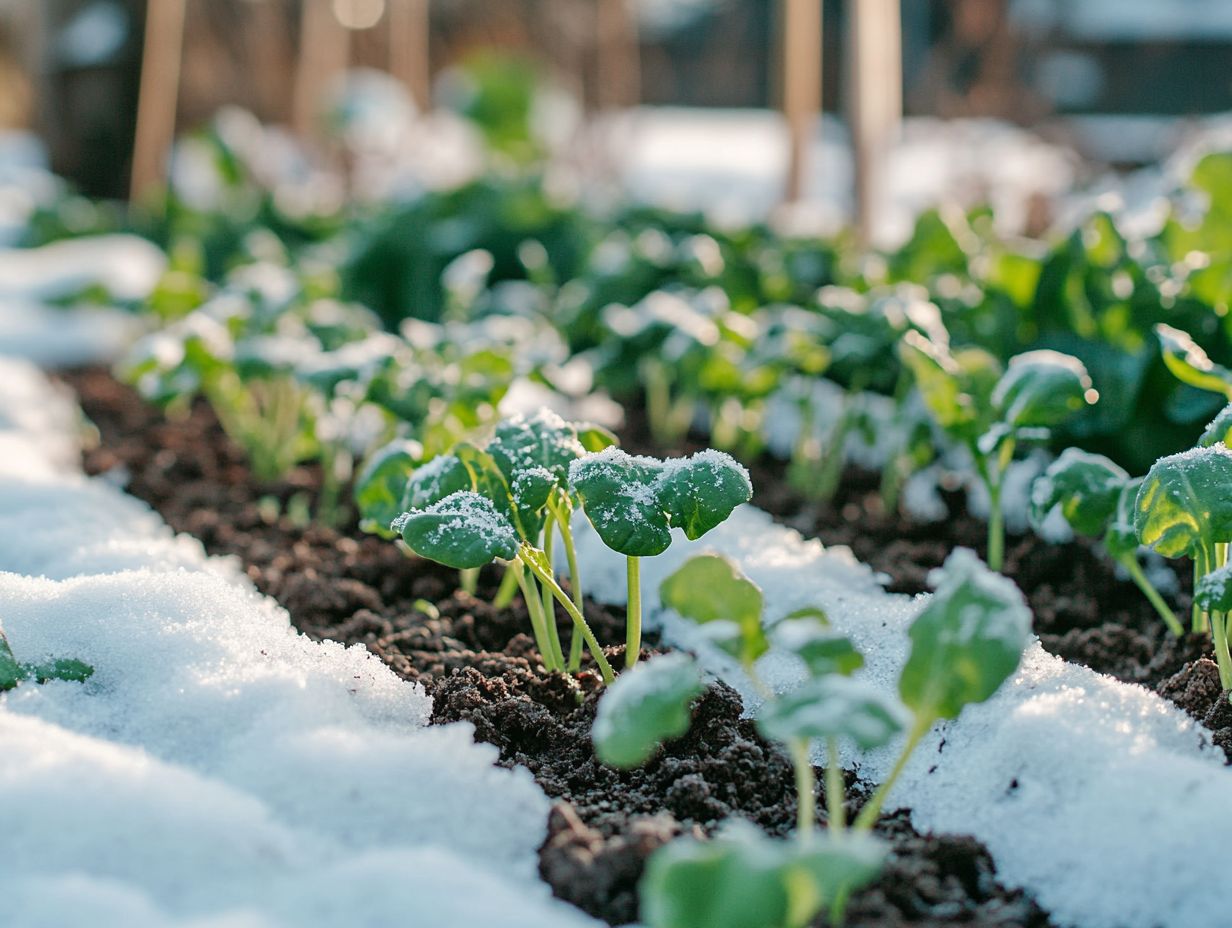
5 Simple Ways to Keep Your Soil Thriving This Winter!
1. Mulching: Adding a layer of mulch protects the soil from harsh winter elements, retains moisture, and provides nutrients as it decomposes. It’s also important to learn how to manage soil temperature in winter for optimal plant health.
2. Cover Cropping: Planting cover crops prevents erosion, adds nutrients, and improves soil structure during the winter months, but it also helps tackle the top 5 challenges in winter gardening.
3. Composting: Continue composting through winter to add organic matter and nutrients for the next growing season, which aligns well with winter planting strategies for gardeners.
4. Avoid Tilling: Tilling disrupts soil structure and exposes it to harsh conditions. Instead, use no-till methods or minimal disturbance to keep soil healthy.
5. Rotate Crops: Crop rotation helps prevent nutrient depletion and reduces the risk of diseases and pests during winter, making it essential to follow best practices for soil preparation in winter.
How Does Mulching Help Keep Soil Healthy in Winter?
Mulching acts as a protective layer for the soil, preventing exposure to harsh elements. It retains moisture, reduces erosion, and provides nutrients as the mulch decomposes.
Why Is Cover Cropping Important for Soil Health in Winter?
Cover cropping prevents erosion, adds nutrients, and improves soil structure. This practice keeps soil healthy and ready for the next growing season.
Can I Continue Composting in Winter?
Yes! You can continue composting in winter. This practice adds organic matter and nutrients for the next growing season.
Is Tilling Recommended for Keeping Soil Healthy in Winter?
No, tilling is not recommended. It disrupts soil structure and exposes it to harsh conditions. Instead, use no-till methods or minimal disturbance to maintain soil health.
How Does Crop Rotation Benefit Soil Health in Winter?
Crop rotation prevents nutrient depletion and reduces the risk of diseases and pests. This practice helps maintain soil health for future growing seasons.
Start these practices today for a healthier garden next season!



